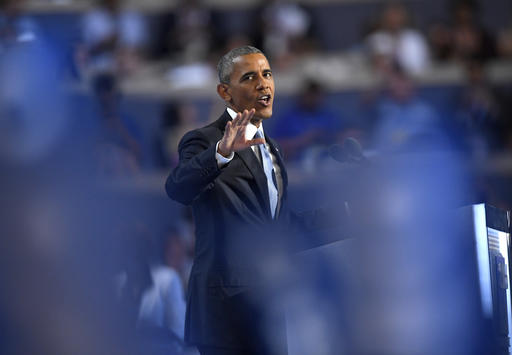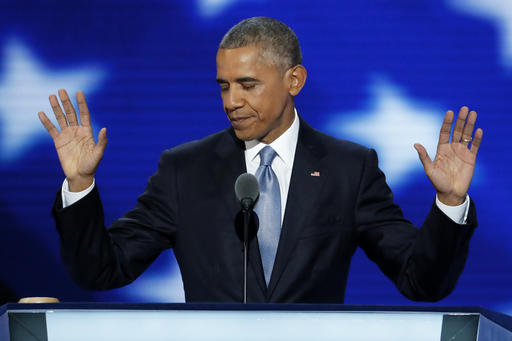President Obama, the coalfields, and this election
July 28, 2016 by Ken Ward Jr.
Last night, during a remarkable speech at the Democratic National Convention, President Obama again included coal miners in the discussion about what this election is about. Here’s what he said:
It can be frustrating, this business of democracy … When the other side refuses to compromise, progress can stall. People are hurt by the inaction. Supporters can grow impatient and worry that you’re not trying hard enough, that you’ve maybe sold out.
But I promise you, when we keep at it, when we change enough minds, when we deliver enough votes, then progress does happen. And if you doubt that, just ask the 20 million more people who have health care today. Just ask the Marine who proudly serves his country without hiding the husband that he loves.
If you want to fight climate change, we’ve got to engage not only young people on college campuses, we’ve got to reach out to the coal miner who’s worried about taking care of his family, the single mom worried about gas prices.
You can read the whole speech here or watch it below:
It’s a great point, and it reminds me of the speech that AFL-CIO President Richard Trumka — who knows a thing or two about coal miners — made more than four years ago, urging the nation to have a broader, more meaningful and more inclusive discussion about the future of coal. Trumka talked about how the folks he grew up with understood climate change, perhaps in more meaningful ways that some of the world’s top scientists:
And to those who say climate risk is a far off problem, I can tell you that I have hunted the same woods in Western Pennsylvania my entire life and climate change is happening now—I see it in the summer droughts that kill the trees, the warm winter nights when flowers bloom in January, the snows that fall less frequently and melt more quickly.
And he reminded environmental groups that policies that change our energy system affect real people in places like Southern West Virginia:
When these folks hear “End Coal,” it sounds like a threat to destroy the value of our homes, to shut our schools and churches, to drive us away from the place our parents and grandparents are buried, to take away the work that for more than a hundred years has made us who we are.
So why, in an economy without an effective safety net, would the good men and women of my hometown and a thousand places like it surrender their whole lives and sit by while others try to force them to bear the cost of change.
The truth is that in many places – and not just places where coal is mined – there is fear that the “green economy” will turn into another version of the radical inequality that now haunts our society—another economy that works for the 1% and not for the 99%.

But it’s a fair point to make, and a fair criticism of President Obama, that in many ways, the people of the coalfields were left out of his administration’s discussions about some of these policies, especially the one about the U.S. Environmental Protection Agency’s Clean Power Plan.
I’ve made the point before on this blog that Sen. Shelley Moore Capito (among others) was correct to complain that EPA should have a public hearing on its regulations closer to — maybe right in the heart of — the nation’s coalfields. It’s true that a hearing was eventually held in Pittsburgh. But coal miners and their families, and other coalfield residents, would have certainly felt more included if there was a hearing even in Charleston, let alone in somewhere like Logan. And who knows what sort of discussion could have been had if the President had planned an event that was more like a community meeting than a public hearing, to hear from coalfield residents about these issues the way he held a successful meeting about drug abuse problems last year here in West Virginia.
It’s true that, as former President Bill Clinton mentioned two nights ago at the Democratic National Convention, Hillary Clinton sent him to West Virginia — and in fact came here herself — to face coal miners and other coalfield residents, to hear from them and to speak to them. And to bring her message of support for a program similar to President Obama’s plans to pump federal money into dealing with coal industry legacy costs like pensions and mine cleanups and to help these parts of our state diversify.
What’s frustrating, though, is that the Obama administration was so late to the game in really putting any focus on these issues. Sure, the Interior Department had for years been sending Congress a budget proposal to release more abandoned mine cleanup money for places like West Virginia — but it has only been in the last two years, really, that the White House has put any public political push on helping the coalfields. So at this point, despite bipartisan support for similar proposals, it seems like quite a tough task to get anything done before a change in administration.
On the other hand, when it comes to interactions with this administration, the whole Friends of Coal crowd really set the tone during the first year of President Obama’s first term, when they simply wouldn’t let anyone they disagreed with get a word in during a public hearing managed — if you can call it that — by the U.S. Army Corps of Engineers. It takes two sides to have a discussion, and the coal industry boosters have never shown much interest in anything but yelling at anyone remotely connected to this administration.
Those are all old fights, but it seems unavoidable that we’re not going to have an election from the top to the bottom of the ballot here that isn’t made out by the career campaign consultants to be mostly about someone who isn’t on the ballot. And if you watch the top Democrat seeking office in West Virginia this year — gubernatorial nominee Jim Justice — he seems just fine with chasing after that strategy.
Still, it’s hard not to think back to the visit that President Obama made to West Virginia in April 2010. It was not really so long ago. Speaking at the memorial service for the 29 miners who died at Upper Big Branch, the president offered this as a value that Americans and West Virginians should try to uphold:
How can a nation that relies on its miners not do everything in its power to protect them? How can we let anyone in this country put their lives at risk by simply showing up to work; by simply pursuing the American dream?
We cannot bring back the 29 men we lost. They are with the Lord now. Our task, here on Earth, is to save lives from being lost in another such tragedy. To do what must be done, individually and collectively, to assure safe conditions underground. To treat our miners the way they treat each other – like family. For we are all family. We are Americans.
It’s quite a different spin than what we’ve heard recently from the West Virginia Coal Association and two other state mining lobby organizations, who argue in a brief filed in support of former Massey Energy CEO Don Blankenship’s appeal. Like Blankenship’s legal team, those groups argue that mine safety violations are inevitable, unavoidable, just part of doing business — a philosophy that, ultimately, leads to societal acceptance of coal miners dying on the job as also just the price that we have to pay to have jobs and energy (see here and here).
In his speech last night, President Obama was also talking about West Virginia’s coalfields when he said this:
There are pockets of America that never recovered from factory closures, men who took pride in hard work and providing for their families who now feel forgotten, parents who wonder whether their kids will have the same opportunities we had.
It doesn’t speak well for the administration that they didn’t jump in far sooner with a plan for the economic collapse ongoing in places like Boone County, West Virginia. But the nation’s going to have to decide if it wants to promote a politics that actually tries to do something for these communities or just holds out empty promises of an impossible return to the past.

 Subscribe to the Coal Tattoo
Subscribe to the Coal Tattoo
